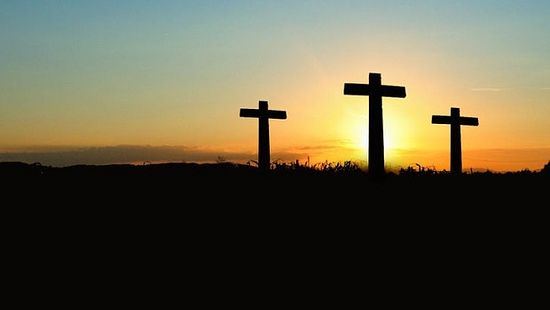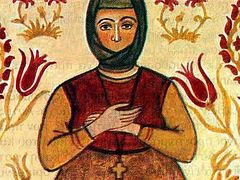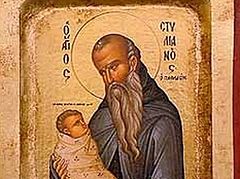Source: Orthodox Christian Network
March 14, 2016
The Great 40 Days are generally considered to be a time of introspection and repentance. The very first words of the Great Canon of St Andrew indicate the way, “Where shall I begin to lament the deeds of my wretched life? What first-fruit shall I offer, O Christ, for my present lamentation?”
The Kontakion we sing in the Great Canon is resoundingly personal:
My soul, my soul, arise!
Why are you sleeping?
The end is at hand; destruction hangs over you!
Come again to your senses, that you may be spared by Christ our God—
Who is everywhere, filling all things!
The Prayer of St Ephraim likewise turns inward:
O Lord and Master of my life:
Take from me the spirit of sloth, despair, lust of power, and idle talk!
But give rather the spirit of chastity, humility, patience, and love to thy servant.
Yea, O Lord and King, grant me to see my own sins, and not to judge my brother—
For thou art blessed unto ages of ages. Amen.
Our fasting, while a corporate practice (those who are able all fast from the same things at the same time), is personal, and for the change of my own heart, my own willfulness, my own ways.
The Sunday of the Last Judgment, which we have just completed, shows the balance point between the inward and outward foci of Great Lent. To summarize using the words of St James, “faith without works is dead”. Or in the words of the Holy Apostle and Evangelist John, in his first epistle, “If any one says, ‘I love God’ and hates his brother, he is a liar; for he who does not love his brother whom he has seen, cannot love God, whom he has not seen. And this commandment we have from him, that he who loves God should love his brother also.” Or, in another place, read on Meatfare Saturday: “the hour is coming when all who are in the tombs will hear his voice and come forth, those who have done good, to the resurrection of life, and those who have done evil, to the resurrection of judgment.”
The season of Great Lent is, to a significant degree, a return to conformity to the likeness of God, a transformation back into a human being. Having lived in the world almost a year since the last Pascha, we fall into the routines and device of what St Paul calls “the old man”. Precisely into those ways enumerated in the Prayer of St Ephraim—the facets from which we ask God to deliver us.
Some of us, thinking that we can earn God’s love, seek to do good deeds in Lent, as if it were a way to store up or to regain merits, in a deficit personal spiritual economy. But neither is this the case, nor is it the way God works. He already loves us—on his part, there is no love lost, or lack to regain. He doesn’t love us less—we love ourselves more than we love him!
One surprising aspect of the Gospel from the Sunday of the Last Judgment is how the righteous reply when Jesus says, “I was hungry and you gave me food, I was thirsty and you gave me drink, I was a stranger and you welcomed me, I was naked and you clothed me, I was sick and you visited me, I was in prison and you came to me.” They didn’t deny doing these things, with a false sense of humility. It just didn’t dawn on them that there was any other right thing to do. That is to say, their actions were based on love for those in need, not on some perceived benefit, temporal or spiritual, to themselves.
The inner work of evangelism: to hear the Good News afresh ourselves, and to return to Christ, intends to produce external evangelism: the sharing with others, rooted in gratitude, of the bounties given to me by God who is love.
Standing outside the closed Gates of Paradise with this coming Sunday’s “Expulsion of Adam and Eve from Paradise”, what is our practical evangelism? It is, through the services, through the prayers, through the fasting, through acts of mercy, to become a human being, perhaps for the first time. All of these ascetical practices are an opportunity to see and experience God for who He truly is, and to be transformed ourselves into whom we are called to be.
The gift is offered to you and to me. Why deny it?
Forgiveness Sunday Homily by Fr. John Parker
If anyone be devout and love God,
Let him commence this radiant fast with joy!
If anyone be a wise servant,
Let him, rejoicing, enter into the school of repentance.
We who have wallowed long in sin,
Let us now begin our return.
If anyone has strayed from the first hour,
Let him today repent with zeal.
If anyone has sinned from the third hour,
Let him with gratitude embrace the fast.
If anyone has fled God from the sixth hour,
Let him have no misgivings about his prompt return;
Because he shall in nowise be turned away therefore.
If anyone has indulged the flesh since the ninth hour,
Let him draw near, fearing God alone and trusting in His mercy.
And if anyone has turned away only at the eleventh hour, Let him also not hesitate to turn back with haste.
For the Lord, who is longsuffering and full of compassion and mercy, will accept the last even as the first.
He restores him who repents at the first hour,
As He does him who turns back at the eleventh.
And He shows mercy upon the last,
And cares for the first;
And to the one He gives,
And upon the other He bestows gifts.
And He both accepts the confession,
And welcomes the intention,
And honors the contrite heart and rejoices in the return.
Wherefore, enter all of you into the holiness of your Lord;
Offer your repentance,
Both the last, and likewise the first.
You rich and poor together, repent, for today we stand outside the closed gates of paradise.
You sober and you heedless, prostrate yourselves before your King!
Return to the Lord today, both you who have sinned with knowledge and those who have done so in ignorance.
Your pantries are full; empty them to the hungry.
The belly enslaves us, let no one be dominated thereby.
Enter all of you into the Great Fast;
Stripped of heavenly wealth by sin, all draw near to God’s rich loving-kindness!
Let no one despair in his sinfulness,
For the Bridegroom comes at midnight.
Weep all of you for your iniquities,
And draw near to the life-giving Cross of our Lord.
Let no one put confidence in the flesh,
For the Devil has deceived us all thereby, and therewith enslaves us to sin.
By turning from God, we are made captives.
We have called good evil and evil good, and put bitter for sweet, and sweet for bitter.
And Isaiah, foretelling this, did cry:
Woe to those who put darkness for light, and light for darkness!
We are embittered, for we are banned from Eden.
We are embittered, but it is we who have mocked God.
We are embittered, for now we shall surely die.
We are embittered, for we have succumbed to the serpent.
We are embittered, for we are fettered in chains.
We partook of a fruit, and met the deceiver.
We were entrusted with paradise, but we chose Hell.
Our eyes were opened to see the nakedness of sin.
Be pleased, O Lord, to deliver us!
O Lord, make haste to help us!
This is the acceptable time, let us repent!
This is the day of salvation, let us crucify the passions!
The end is at hand and destruction hangs over us!
The end draws nigh, let us come again to our senses!
The Kingdom of Heaven is at hand, what first-fruit shall we offer?
Let us delay not, lest we remain dead in the grave, sold under sin!
For God desires not the death of the sinner, but that he should turn from his wickedness and live!
So, let us choose life, and live, for the mercy of God endures forever!
To Him be glory and dominion
Unto ages of ages. Amen.




